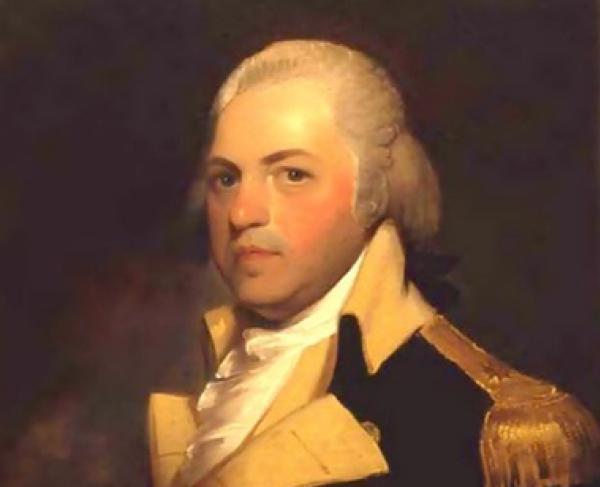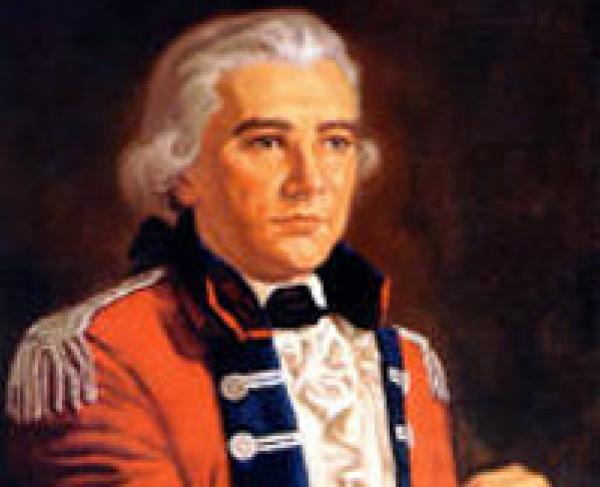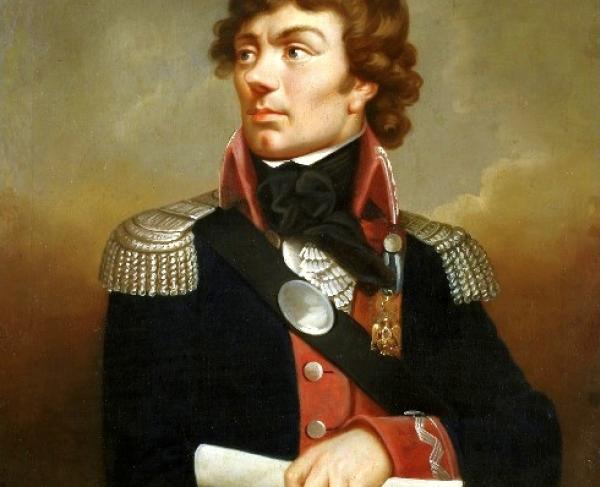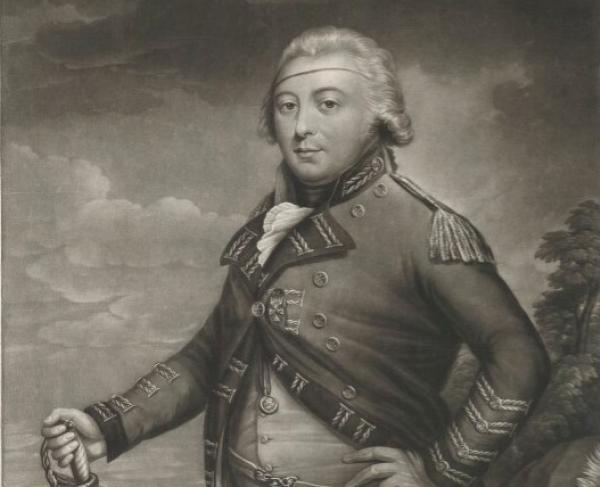Henry Lee III

Henry Lee III or, as he was referred to after the American Revolution, “Light-Horse” Harry Lee, was one of George Washington’s most tenacious cavalry commanders. Lee was best known for leading the Second Partizan Corps or "Lee's Legion" during the conflict. Being the father of Civil War General Robert E. Lee has overshadowed many of his other personal achievements. Lee at times was impetuous and was an aggressive fighter. His loyalty to the American cause and George Washington made him a popular figure after the war. Additionally, his personal memoirs, written after the war to extricate him from his problem with debt, provide a comprehensive and sometimes altered view of the Southern Campaigns.
Lee was born into the Virginia gentry on January 29, 1756, at Leesylvania, located in Prince William County. Lee’s father, Henry Lee II, served in the Virginia House of Burgesses and was involved in the local militia and courts. Unlike many other Virginians who went to Europe for education, Lee attended the College of New Jersey (Princeton). Here he interacted with other future leaders such as James Madison. Graduating in 1773 to pursue a legal career, Lee returned to New Jersey but this time as a cavalry commander in the American army.
The following June, Lee’s father and other local leaders signed the Prince William Resolves, calling for a ban on importation of British goods and to support the Massachusetts colony. It was clear where the family allegiances lay in the coming conflict with Great Britain. The American Revolution broke out in April 1775, but Lee did not officially join a military unit until June 1776, when Governor Patrick Henry commissioned Lee a captain in the Virginia Light Horse. He would lead the 5th Troop serving under his cousin, Colonel Theodorick Bland. Lee with his other dragoons trained in Williamsburg and awaited orders.
By December, Washington was looking for cavalry for his army. He wrote, “I am convinced there is no carrying on the War without them (cavalry), and I would therefore recommend the Establishment of one or more Corps…in addition to those already raised in Virginia.” Shortly after, Bland’s regiment, including Lee’s Troop were accepted into Continental service as the First Regiment of Light Dragoons. Lee arrived in Philadelphia with his dragoons in January 1777 and began serving Washington by scouting, foraging for supplies, gathering intelligence, and raiding enemy supply routes. Lee began to attract attention from other officers and his close relationship with Washington was seen as an advantage for him. Throughout his service, Lee quarreled with several other officers and held strong opinions of those who disagreed with him.
Lee’s skill as a cavalry commander became more apparent as his men performed admirably in the tasks they were given - so much so that the condition of their horses took a toll from the constant work. During this time, one of Lee’s most daring moments took place. On the evening of January 19, 1778 (a date that, 29 years later saw the birth of his son, Robert Edward Lee), Lee set up his headquarters for the night at Spread Eagle Tavern. Lee had begun to draw the ire of many British officers for his raids on British troops and was the target of capture. When the Queen's Rangers and British dragoons learned of his location, they planned a quick strike to capture Lee. On the morning of January 20, Lee and eight others were in the tavern. The British were able to either capture or brush aside Lee’s pickets, allowing them to trap the others in the tavern as they called for Lee’s surrender. Lee refused and the eight others manned the doors and windows, keeping up such a heavy fire that the British cavalry finally gave up and left. The story soon spread through the army and Lee’s legend grew.
Lee lobbied Washington and his friends in Congress to allow him to form his own “legion,” a mixed force of cavalry and infantry. In April 1778, Congress authorized Lee to command three troops of cavalry and engage in partisan operations. The following August, Lee planned and led an assault on the British post of Paulus Hook on the Hudson River. His victory in capturing the position earned him a Gold Medal from Congress.
In November 1780, Lee was promoted to lieutenant colonel and his cavalry augmented by three companies of infantry, thus creating "Lee's Legion". At the personal request of Nathanael Greene, Lee left Washington's command to join the Southern Army. Lee cooperated with Brig. Gen. Francis Marion's militia in operations around Georgetown, South Carolina earlier the following year before playing a major role in covering Greene's army in the latter stages of the "Race to the Dan".
Several weeks later Lee and Andrew Pickens, set out to locate Lt. Col. Banastre Tarleton and the British Legion. Rather than encountering Tarleton, Lee and Pickens came across another Loyalist militia unit of about 400 men under John Pyle who was hoping to connect with Tarleton. When Lee’s men caught up to Pyle, the British mistook Lee’s Legion for Tarleton and his men. In an element of surprise and brutality, Lee marched his men up next to Pyle’s column and ambushed them. Some claim that Pickens' men started the fight, but what happened was a bloody massacre with 93 Loyalists killed and 250 wounded. Lee's legion suffered just one casualty. Later, there were many claims that the Americans gave no quarter to Pyle’s men. Lee was highly criticized for the action, but it had a significant impact on keeping other Loyalists from joining Cornwallis’ army.
A few weeks later, Lee fought Battle of Guilford Courthouse on the left flank of the Continental line. Lee was at his best serving as a partisan and provided great work in capturing British outposts across the south at Augusta, Fort Watson, Fort Motte, Fort Granby, and others. Lee participated along with Greene in the siege of the British outpost Ninety-Six in May and June 1781. Unable to capture Ninety-Six, Greene eventually withdrew in the face of reinforcements under Lord Francis Rawdon.
After Rawdon relieved Ninety-Six, he eventually marched his army eastward towards Charleston. Greene was determined to attack and destroy the last major British army in South Carolina. On September 8, 1781, Greene launched an assault on the British at Eutaw Springs. The British, under Lieutenant Colonel Alexander Stewart, were initially surprised by Greene’s army and lost 400 men captured. However, Stewart was able to form battle lines and fought Greene’s larger force for a few hours until the British were slowly forced back through their camps. A local home, “Brick House” became a rallying point for Stewart’s redcoats with some men using the house as a makeshift fort. Lee and his Legion were ordered to assault the new British left in hopes of rolling up the line. Lee’s assaults were unsuccessful and the American assault along the whole line stalled. Soon a British counterattack forced Greene’s army from the field. Both sides claimed victory with Stewart holding the field and Greene inflicting heavy casualties. Stewart soon marched his men to Charleston, ending the major fighting in South Carolina. Though Lee’s men fought hard, Eutaw Springs created a rift between Greene and Lee. Some in the American army blamed Lee’s men for not rolling up the British left flank. Lee was unhappy with Greene’s after-battle report not giving appropriate credit for the fighting his men did. Greene also noted that Lee’s cavalry was “baffled in an attempt on the right.”
Assigned to carry dispatches to Washington, Lee arrived at Yorktown in time for the British surrender. Many believe his many quarrels with other officers and what he perceived as a lack of respect led to his resignation. Lee’s temperament was probably his biggest flaw. After the war, he dabbled in many business ventures that led to his eventual bankruptcy. He was elected Governor of Virginia and to a term in Congress. His natural profession, military arms, eluded him except for a brief period when he led militia forces in 1794 to put down the Whiskey Rebellion. His rashness and irresponsible use of money caused many to avoid him. In 1782, he married Matilda Ludwell Lee, and resided at her plantation, Stratford Hall, in Westmoreland County, Virginia. One of his proudest moments came when he gave George Washington’s eulogy to Congress, where he said famously "First in war, first in peace, and first in the hearts of his countrymen.” By 1812, Lee, a staunch Federalist, became more of an outcast due to his political views. That year in Baltimore, he was badly beaten by an anti-Federalist mob. He never fully recovered from his wounds and died in 1818.
Related Battles
98
624
579
882
1,310
532


